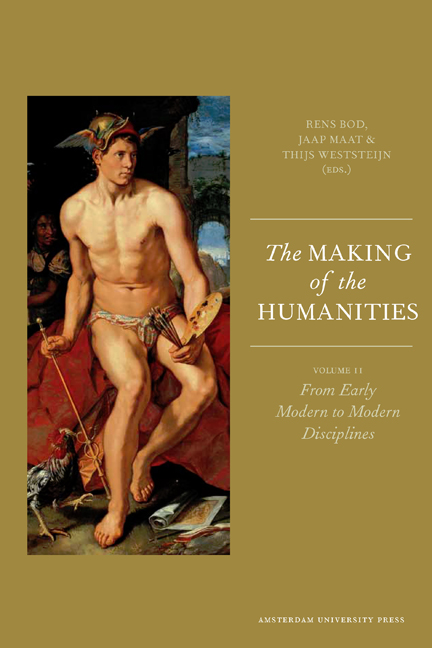Book contents
- Frontmatter
- Contents
- Introduction: The Dawn of the Modern Humanities
- I Linguistics and Philology
- II The Humanities and the Sciences
- III Writing History and Intellectual History
- IV The Impact of the East
- V Artworks and Texts
- VI Literature and Rhetoric
- VII Academic Communities
- Contributors
- List of Figures
- Index
The Middle Kingdom in the Low Countries: Sinology in the Seventeenth- Century Netherlands
Published online by Cambridge University Press: 19 January 2021
- Frontmatter
- Contents
- Introduction: The Dawn of the Modern Humanities
- I Linguistics and Philology
- II The Humanities and the Sciences
- III Writing History and Intellectual History
- IV The Impact of the East
- V Artworks and Texts
- VI Literature and Rhetoric
- VII Academic Communities
- Contributors
- List of Figures
- Index
Summary
China is a ‘noble diamond, sparking divinely in the eye’, according to Joost van den Vondel (1587-1679). The Dutch ‘Prince of Poets’ was not alone in esteeming the Middle Kingdom so highly. Not only was Amsterdam a staple market of Chinese goods and works of applied art. Various efforts of early European scholarship on China were products of the Netherlands as well. The earliest illustrated books, printing types, discussions of Chinese history, and editions of Confucius originated in the Low Countries. We may call this the ‘proto-sinology’ of the seventeenth century, as Chinese studies became an academic discipline only in 1876 when a chair was established at Leiden's university, followed by Louvain in 1884.
This chapter will explore how the efforts of individual scholars, linked through networks of trade and correspondence that joined Amsterdam, Antwerp and Beijing, resulted in cross-cultural exchanges of knowledge. Even though taking place in the margin of the academic curriculum, they sparked new ideas in the humanities. As Timothy Brook observes, ‘Though regarded as a minor academic discipline today, sinology in the seventeenth century played an important role in the formation of the modern European disciplines of geography, history, and social theory’. We may add different branches of the humanities to this list. Exchanges moved along four related fronts. The first focused on the Chinese language and its script. The second front, building on Renaissance practices of philology, involved the translation of the Chinese classical works into Latin. The third related to music and the visual arts. Finally, knowledge of Chinese history impacted Biblical criticism, paving the way for the role that China (or rather, European images of China) would come to play in the European Enlightenment.
Even though recent scholarship has observed that the Netherlands were ‘Europe's primary entrepot for information about Asia’ and that the Dutch perception of China has ‘considerable significance for understanding early modern European culture generally’, the impact of this exchange on the humanities has been neglected.
- Type
- Chapter
- Information
- The Making of the HumanitiesVolume II: From Early Modern to Modern Disciplines, pp. 209 - 242Publisher: Amsterdam University PressPrint publication year: 2012
- 1
- Cited by



